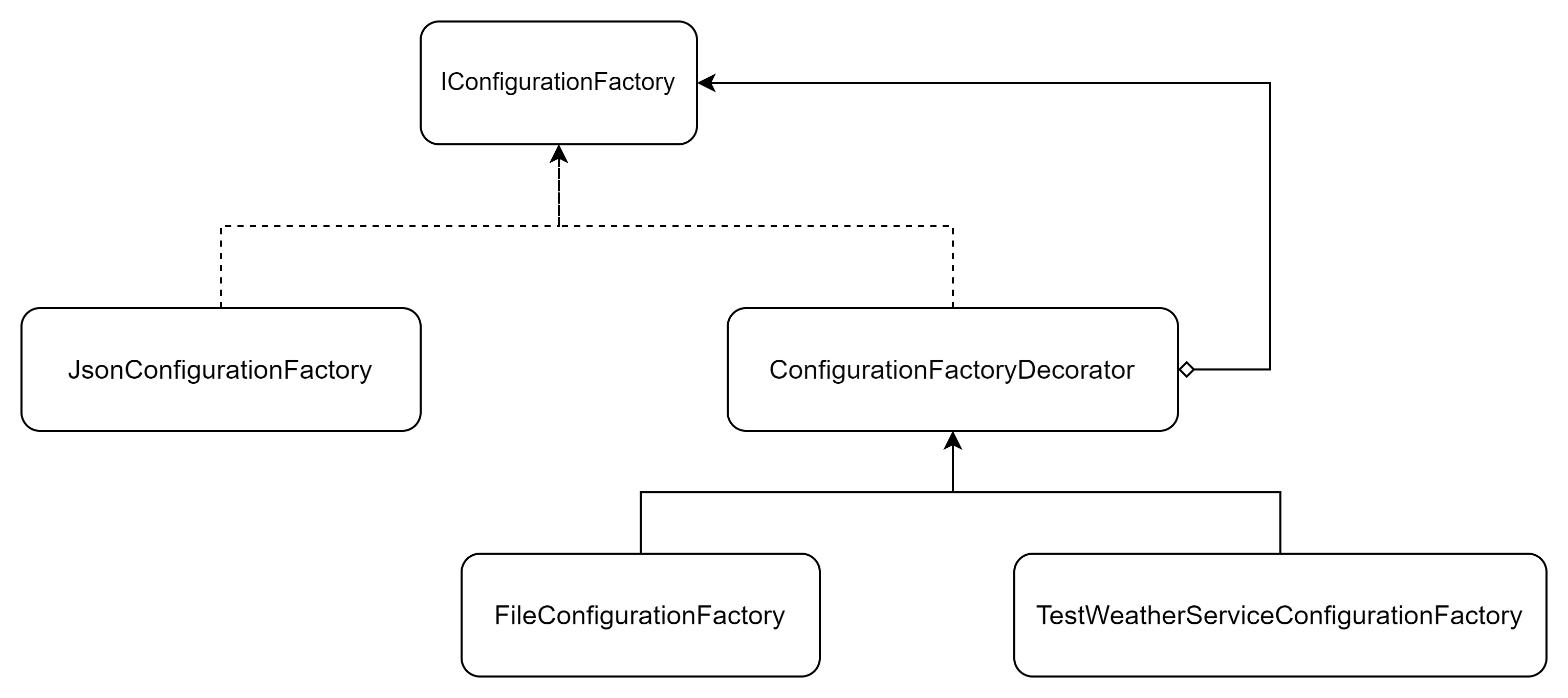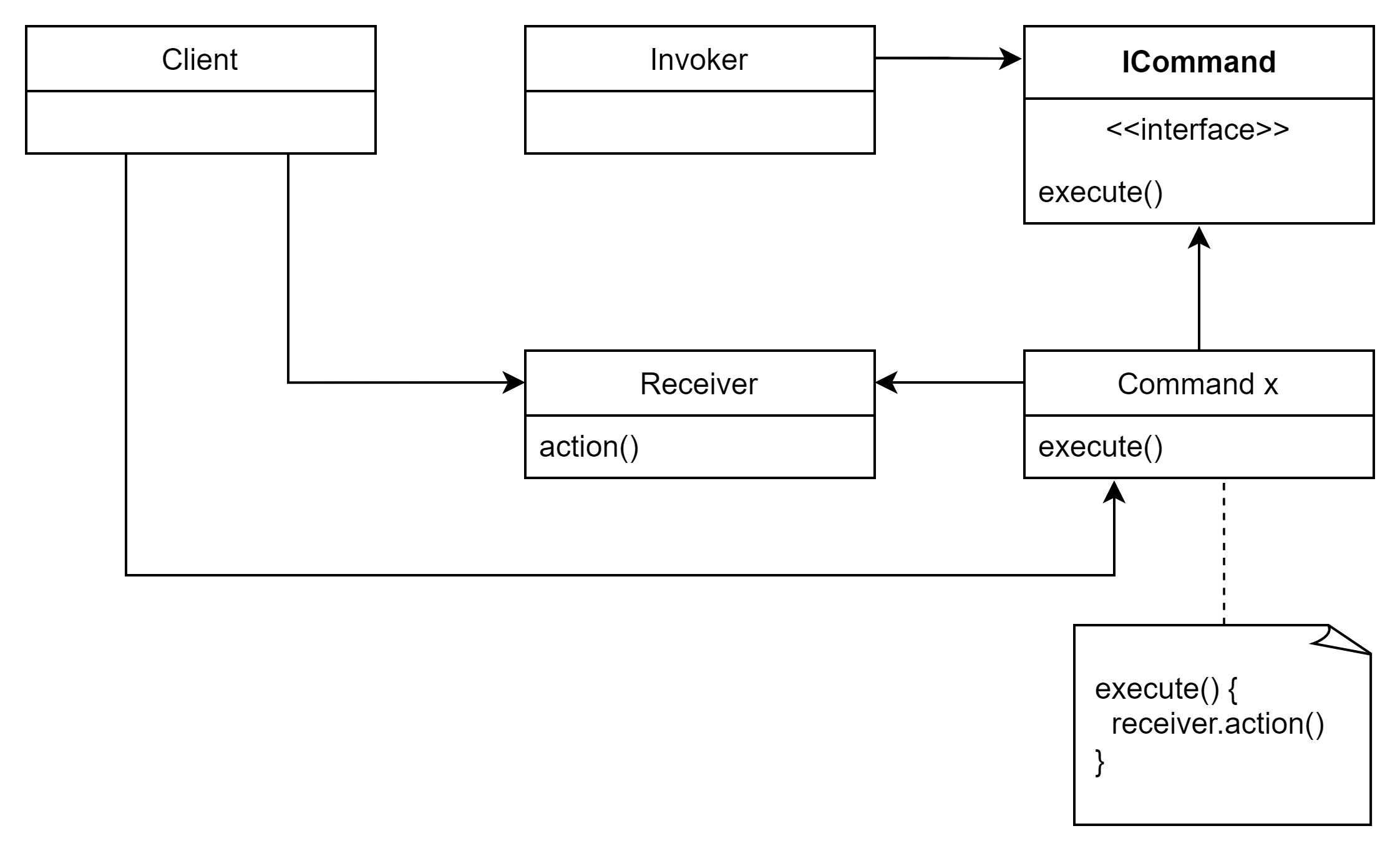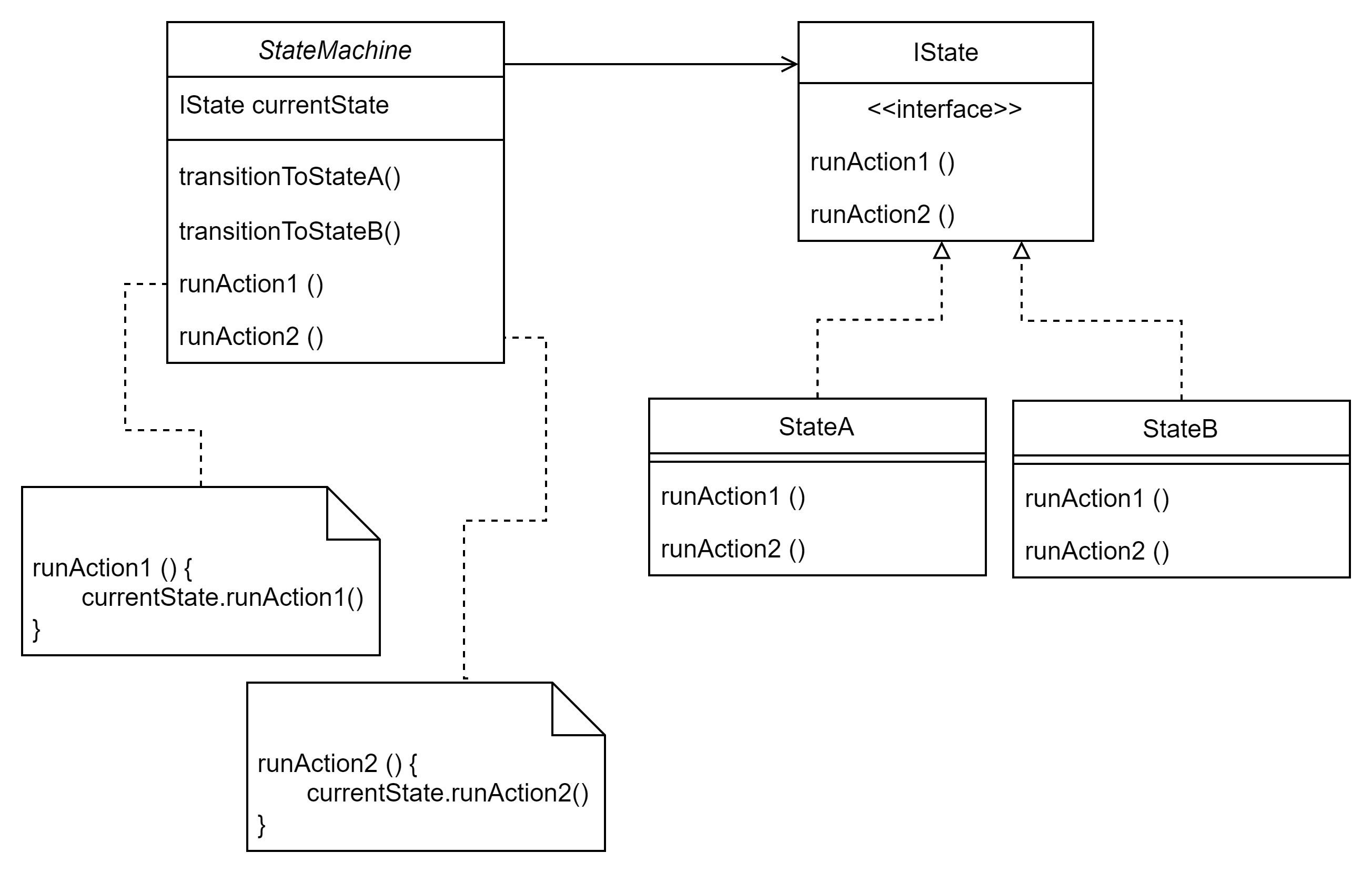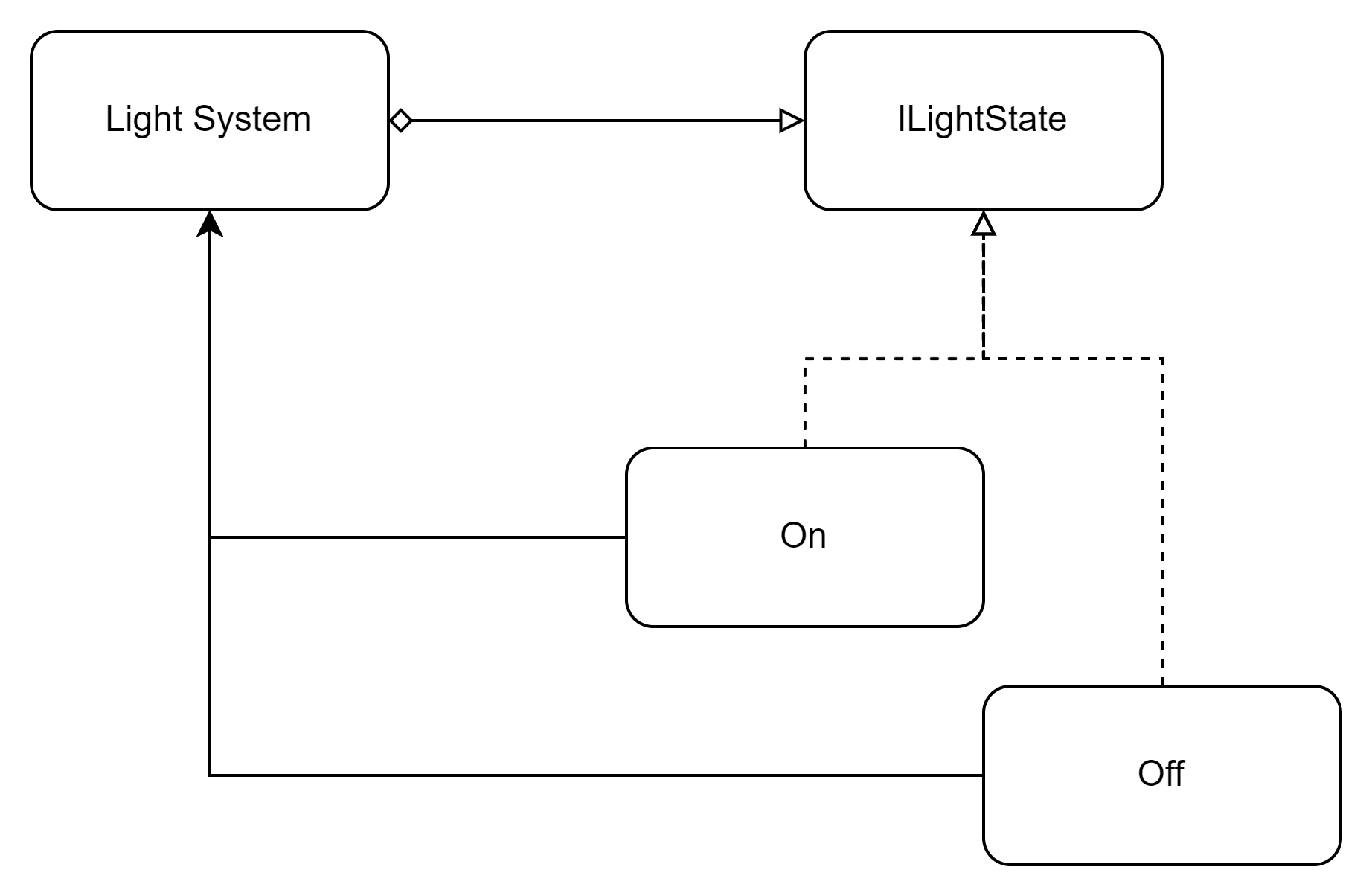CleanCodeWorkshop
Share ideas and recommendations for clean implementations
Clean Code
Your code should be as easy to read as a newspaper. Code is like a joke. If you have to explain it, it's bad. Make your life easier. Write clean code.
Resources
- Clean Code - Robert C. Martin
- Don't make me think - Steve Krug
- Clean Architecture - Robert C. Martin
SOLID
- Single Responsibility Principle - A module should have one, and only one, reason to change.
- Open/Closed Principle - Software entities (classes, modules, functions, etc.) should be open for extension, but closed for modification.
- Liskov Substitution Principle - Objects in a program should be replaceable with instances of their subtypes without altering the correctness of that program.
- Interface Segregation Principle - Many client-specific interfaces are better than one general-purpose interface.
- Dependency Inversion Principle - One should depend upon abstractions, not concretions.
Design patterns
Patterns are not solutions. They are, battle tested, reusable, software design concepts that can be applied to solve problems. Design patterns help use to write clean code.
Resources
- Design Patterns: Elements of Reusable Object-Oriented Software - Erich Gamma, Richard Helm, Ralph Johnson, John Vlissides, Grady Booch
- Head First Design Patterns - Eric Freeman, Bert Bates, Kathy Sierra, Elisabeth Robson
Examples
Your code should be as easy to read as a newspaper.
Can you understand this function? Why?
def getCurrentWeather(self, city: str, stateCode: str, countryCode: str) -> Weather or None:
location: Geolocation = self.__getGeolocation(city, stateCode, countryCode)
if location is None:
return None
parameters = {'lat': location.latitude, 'lon': location.longitude, 'units': self.__units, 'appid': self.__apiKey}
result = requests.get(self.__dataUrl, params=parameters)
if result is None or isNotPositiveResponse(result.status_code):
return None
try:
data = result.json()
return self.__weatherMapper.fromJson(data)
except KeyError as error:
self.__logger.error(f"Missing key in weather data for {city},{stateCode},{countryCode}: {error}")
return None
except Exception as error:
self.__logger.error(f"Unexpected weather data for {city},{stateCode},{countryCode}: {error}")
return NoneYour solution design should be easy to read
What are the folders you would expect when using MVC?
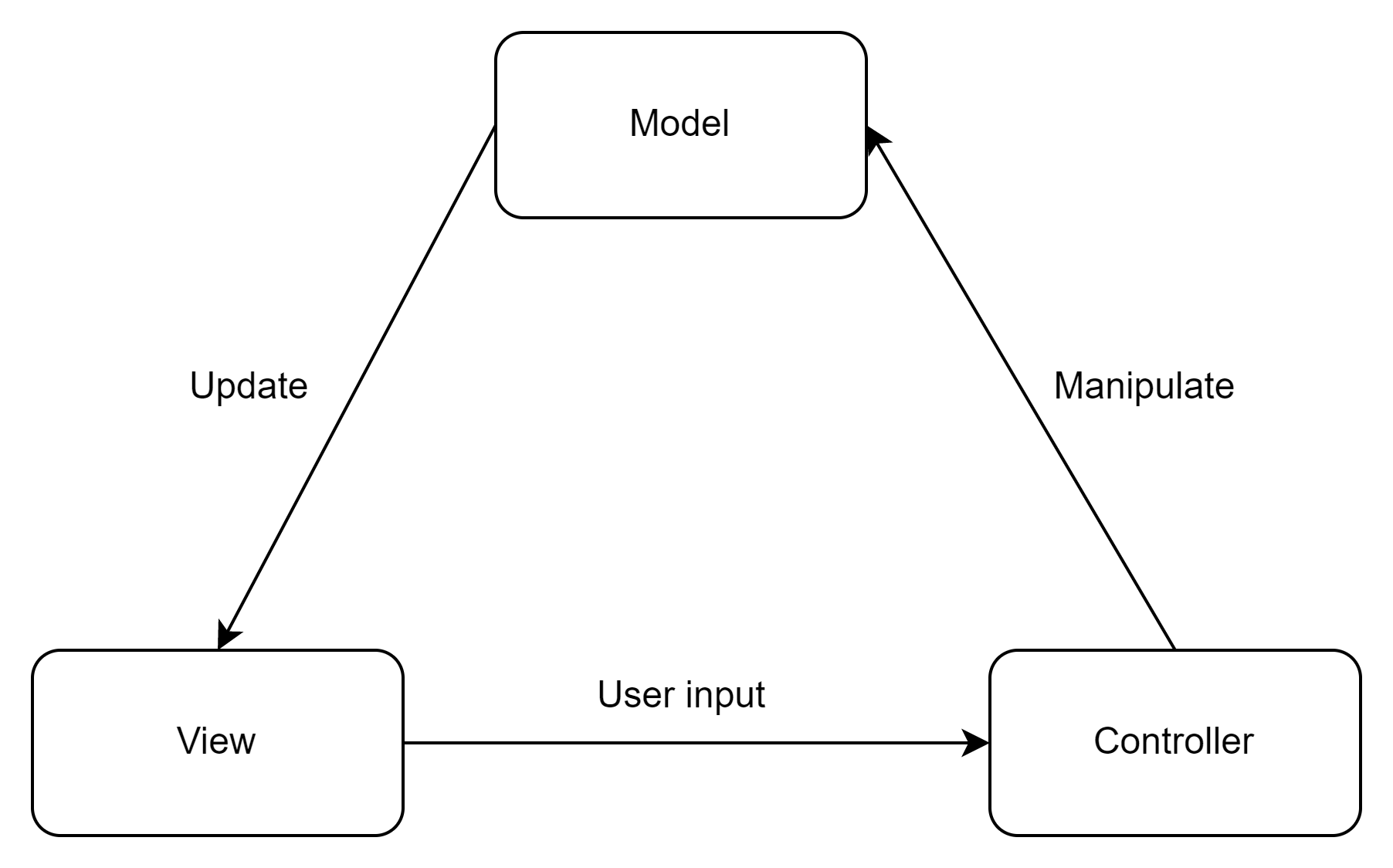
- Avoid hybrid structures (half object and half data).
- Single Responsibility Principle - A module should have one, and only one, reason to change.
Design patterns improves our ability to communicate with other developers.
Favor polymorphism to if/else cascade or switch/case
Don't use flag arguments. Split method into several independent methods that can be called from the client without the flag.
class Logger(ILogger):
def __init__(self, loggerName: str, level: int, handlerCollection: []):
...
for handler in handlerCollection:
self.addHandler(handler)
...def getStdOutLogHandler():
handler = logging.StreamHandler()
handler.setFormatter(getFormatter())
return handler class StreamHandler(Handler):def getRollingFileLogHandler(fileName, maxBytes, backupCount):
handler = RotatingFileHandler(fileName, maxBytes=maxBytes, backupCount=backupCount)
handler.setFormatter(getFormatter())
return handler class RotatingFileHandler(BaseRotatingHandler):
...
class BaseRotatingHandler(logging.FileHandler):
...
class FileHandler(StreamHandler):def callHandlers(self, record):
"""
Pass a record to all relevant handlers.
Loop through all handlers for this logger and its parents in the
logger hierarchy. If no handler was found, output a one-off error
message to sys.stderr. Stop searching up the hierarchy whenever a
logger with the "propagate" attribute set to zero is found - that
will be the last logger whose handlers are called.
"""
c = self
found = 0
while c:
for hdlr in c.handlers:
found = found + 1
if record.levelno >= hdlr.level:
hdlr.handle(record)
if not c.propagate:
c = None #break out
else:
c = c.parentDesign patterns make heavy use of polymorphisms
class IConfigurationFactory(ABC):
@abstractmethod
def get(self, configData):
passclass JsonConfigurationFactory(IConfigurationFactory):
def get(self, json: str):
return Dynamic.fromJson(json)class FileConfigurationFactory(ConfigurationFactoryDecorator):
def __init__(self):
super().__init__(JsonConfigurationFactory())
def get(self, fileName: str):
with open(fileName) as inputStream:
rawData = inputStream.read()
if rawData is None:
return Dynamic()
return self.configurationFactory.get(rawData)class ConfigurationFactoryDecorator(IConfigurationFactory):
def __init__(self, configurationFactory: IConfigurationFactory):
self.configurationFactory = configurationFactory
@abstractmethod
def get(self, configData):
passclass TestWeatherServiceConfigurationFactory(ConfigurationFactoryDecorator):
def __init__(self):
super().__init__(JsonConfigurationFactory())
def get(self, source: str) -> WeatherServerConfiguration:
result: WeatherServerConfiguration = self.configurationFactory.get(source)
result.ApiKey = os.getenv('API_KEY')
return resultThe invoker is not aware of how the command is executed, it only knows what command to invoke. So the command pattern helps us implement separation of concerns, because the invoker and receiver can change independently of each other.
Liskov Substitution Principle - Objects in a program should be replaceable with instances of their subtypes without altering the correctness of that program.
Dependency Inversion Principle - Depend on abstractions, not concrete instances.
Make your code testable by using dependency injection
def getCurrentWeather(self, city: str, stateCode: str, countryCode: str) -> Weather or None:
...
parameters = {'lat': location.latitude, 'lon': location.longitude, 'units': self.__units, 'appid': self.__apiKey}
...
try:
...
return self.__weatherMapper.fromJson(data)
except KeyError as error:
self.__logger.error(f"Missing key in weather data for {city},{stateCode},{countryCode}: {error}")
return None
except Exception as error:
self.__logger.error(f"Unexpected weather data for {city},{stateCode},{countryCode}: {error}")
return None@inject
def __init__(self,
weatherConfiguration: WeatherServerConfiguration,
geolocationMapper: GeolocationMappers,
weatherMapper: WeatherMappers,
logger: ILogger):
self.__apiKey = weatherConfiguration.ApiKey
self.__geoLocationUrl = weatherConfiguration.BaseUrl+weatherConfiguration.GeoLocationEndpoint
self.__dataUrl = weatherConfiguration.BaseUrl+weatherConfiguration.DataEndpoint
self.__units = weatherConfiguration.Units
self.__geolocationMapper = geolocationMapper
self.__weatherMapper = weatherMapper
self.__logger = loggerdef configureDependencies(binder):
binder.bind(GeolocationMappers, to=GeolocationMappers(), scope=flask_injector.request)
binder.bind(WeatherMappers, to=WeatherMappers(), scope=flask_injector.request)
binder.bind(WeatherServerConfiguration, to=configuration.WeatherServer, scope=flask_injector.request)
binder.bind(ILogger, to=Logger(__name__, configuration.Logger.Level, [getStdOutLogHandler()]), scope=flask_injector.request)
binder.bind(IWeatherService, to=WeatherService, scope=flask_injector.request)def setUp(self):
weatherConfiguration: str = ('{'
' "BaseUrl": "http://api.openweathermap.org/",'
' "GeoLocationEndpoint": "geo/1.0/direct",'
' "DataEndpoint": "data/2.5/weather",'
' "Units": "metric"'
'}')
self.weatherApiConfiguration: WeatherServerConfiguration = TestWeatherServiceConfigurationFactory().get(weatherConfiguration)
self.logger = Logger(__name__, 0, [getStdOutLogHandler()])
self.weatherServices = [WeatherService(self.weatherApiConfiguration, GeolocationMappers(), WeatherMappers(), self.logger), BadWeatherServiceExample()]
def test_CreateService(self):
for service in self.weatherServices:
self.assertIsNotNone(service, f"Could not create instance for {service.__class__.__name__}")class Logger:
def __init__(self, loggerName: str, level: int, handlerCollection: []):
...
for handler in handlerCollection:
self.addHandler(handler)
...Dependency inversion in the Command Pattern
How would you implement support for a list of commands? (Go to design editor)
Dependency Inversion Principle - One should depend upon abstractions, not concretions.
class UserInterface:
def __init__(self, addCommand: ICommand, subtractCommand: ICommand, multiplyCommand: ICommand, divideCommand: ICommand):
self.__addCommand = addCommand
self.__subtractCommand = subtractCommand
self.__multiplyCommand = multiplyCommand
self.__divideCommand = divideCommand
self.__executedCommands = []
self.__undoneCommands = []class ICommand(ABC):
@abstractmethod
def execute(self, value: float) -> float:
pass
@abstractmethod
def undo(self, value: float) -> float:
passclass AddCommand(ICommand):
def __init__(self, calculator: Calculator):
self.__calculator = calculator
def execute(self, value: float) -> float:
self.__calculator.add(value)
return self.__calculator.currentValue
def undo(self, value: float) -> float:
self.__calculator.subtract(value)
return self.__calculator.currentValueFavor Composition over inheritance.
Stable software architectures favor dependency on stable abstract interfaces. Stable components should not depend on volatile components.
C# examples here:
Presentation here:
Limit dependencies.
A pure function has no side effects. For the same input value it will always generate the same result. Pure functions are easier to test and reuse.
def isNotPositiveResponse(statusCode):
return statusCode < 200 or statusCode > 300def turnOn(self) -> None:
self.__currentState = On(self, self.__log)
def turnOff(self) -> None:
self.__currentState = Off(self, self.__log)
def update(self) -> None:
self.__log.info("Motion detected.")
self.__currentState.processMotionDetected()Decoupling with the Observer Pattern
The observer pattern helps implement pushing updates from one object (subject) to a runtime dynamic list of interested objects (observers).
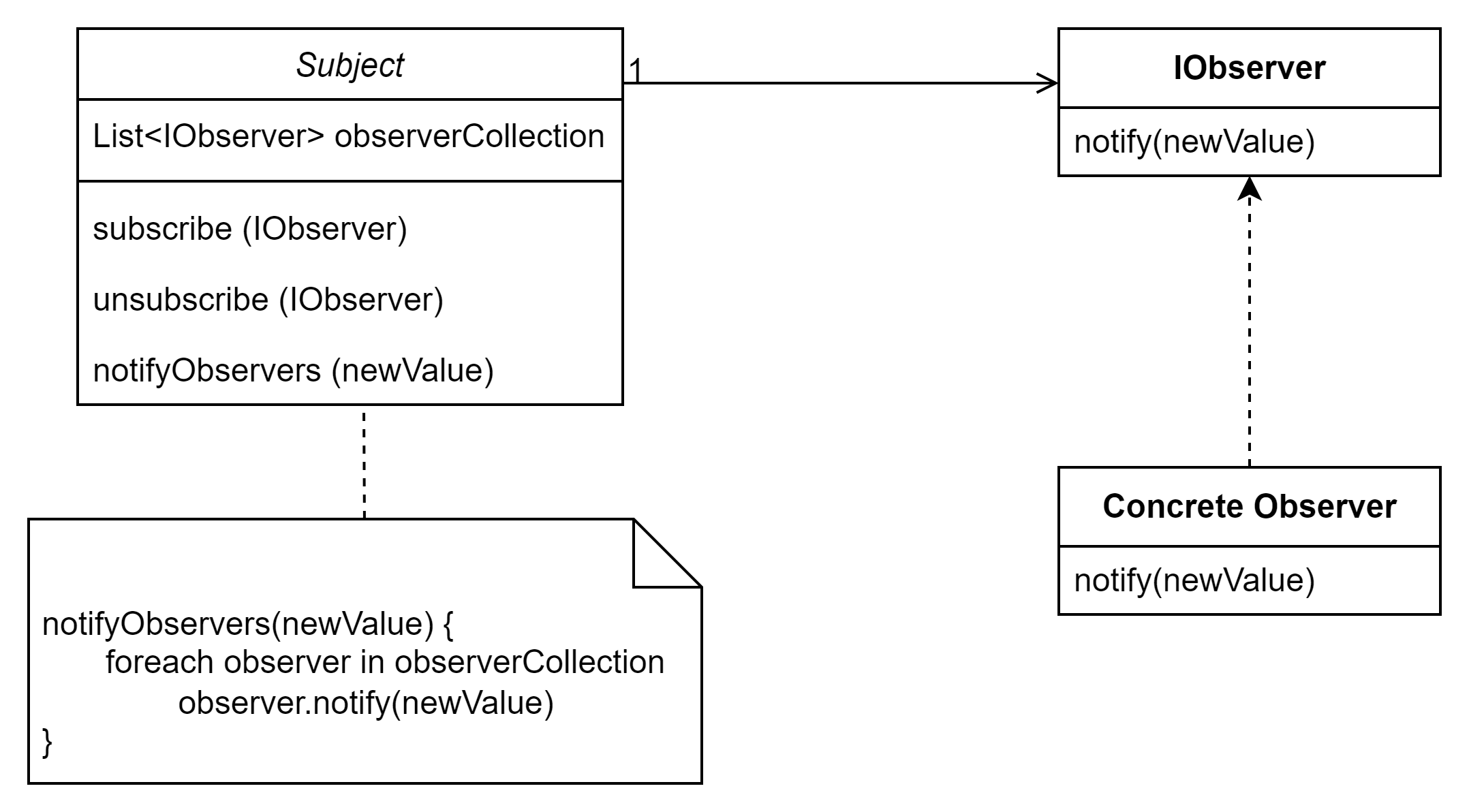 The subject is not dependent on the implementation of the observer because
the subject only knows that the observer implements the observer interface.
The subject is not dependent on the implementation of the observer because
the subject only knows that the observer implements the observer interface.
class MockMotionSensor(IMotionSensor):
...
def subscribe(self, observer: IObserver) -> None:
if observer is not None:
self.__observerCollection.append(observer)
def unsubscribe(self, observer: IObserver) -> None:
if observer is not None:
self.__observerCollection.remove(observer)
def __notifyObservers(self) -> None:
...
for observer in self.__observerCollection:
observer.update()
...class IObserver(ABC):
@abstractmethod
def update(self) -> None:
passclass LightSystem(IObserver):
...
def update(self) -> None:
self.__log.info("Motion detected.")
self.__currentState.processMotionDetected()C# examples here:
- https://github.com/BackToTech-Study/ObserverPattern
- https://learn.microsoft.com/en-us/dotnet/standard/events/observer-design-pattern
Presentation here:
State Pattern
Design patterns are usually bundled together.
All states implement the same interface, so adding new states to a state machine can be done without touching the code of the other states. For this reason, using the sate design patterns helps implement the open-close principle.
class LightSystem(IObserver):
def __init__(self, log: ILogger, timeout: int or None = None):
...
self.turnOff()
...
def turnOn(self) -> None:
self.__currentState = On(self, self.__log)
def turnOff(self) -> None:
self.__currentState = Off(self, self.__log)
def update(self) -> None:
self.__log.info("Motion detected.")
self.__currentState.processMotionDetected()class ILightState(ABC):
@abstractmethod
def processMotionDetected(self) -> None:
passclass Off(ILightState):
def __init__(self, light, log: ILogger):
log.info("Turn off lights.")
self.__light = light
def processMotionDetected(self) -> None:
self.__light.turnOn()class On(ILightState):
def __init__(self, light, log: ILogger):
...
self.__log.info("Turn on lights.")
self.__light = light
self.__timeoutTask = self.__getTimeoutTask()
self.__timeoutTask.start()
def __getTimeoutTask(self) -> Timer:
return Timer(self.__light.timeout, self.__turnOffAfterTimeout, [])
def __turnOffAfterTimeout(self):
self.__log.info("Inactivity timeout reached.")
self.__light.turnOff()
def processMotionDetected(self) -> None:
self.__timeoutTask.cancel()
self.__timeoutTask = self.__getTimeoutTask()
self.__timeoutTask.start()Code smells
Using design patterns bring best code practices to your code. But they also add needless complexity.
What to look for?
- Rigidity. The software is difficult to change. A small change causes a cascade of subsequent changes.
- Fragility. The software breaks in many places due to a single change.
- Immobility. You cannot reuse parts of the code in other projects because of involved risks and high effort.
- Needless Repetition.
- The code is hard to understand.
- Needless Complexity.
Keep configuration data away from the source code.
def getCurrentWeather(self, city: str, code: str, country: str) -> Weather or None:
key = "some key"
p = {'q': f'{city},{code},{country}', 'limit': 1, 'appid': key}
r = requests.get("http://api.openweathermap.org/geo/1.0/direct", params=p)
try:
loc = self.__geolocationMapper.mapJsonToGeolocation(r.json()[0])
p = {'lat': loc.latitude, 'lon': loc.longitude, 'appid': key}
r = requests.get("http://api.openweathermap.org/data/2.5/weather", params=p)
return self.__weatherMapper.mapJsonToWeather(r.json())
except Exception as error:
self.__log.error(f"{error}")
return None